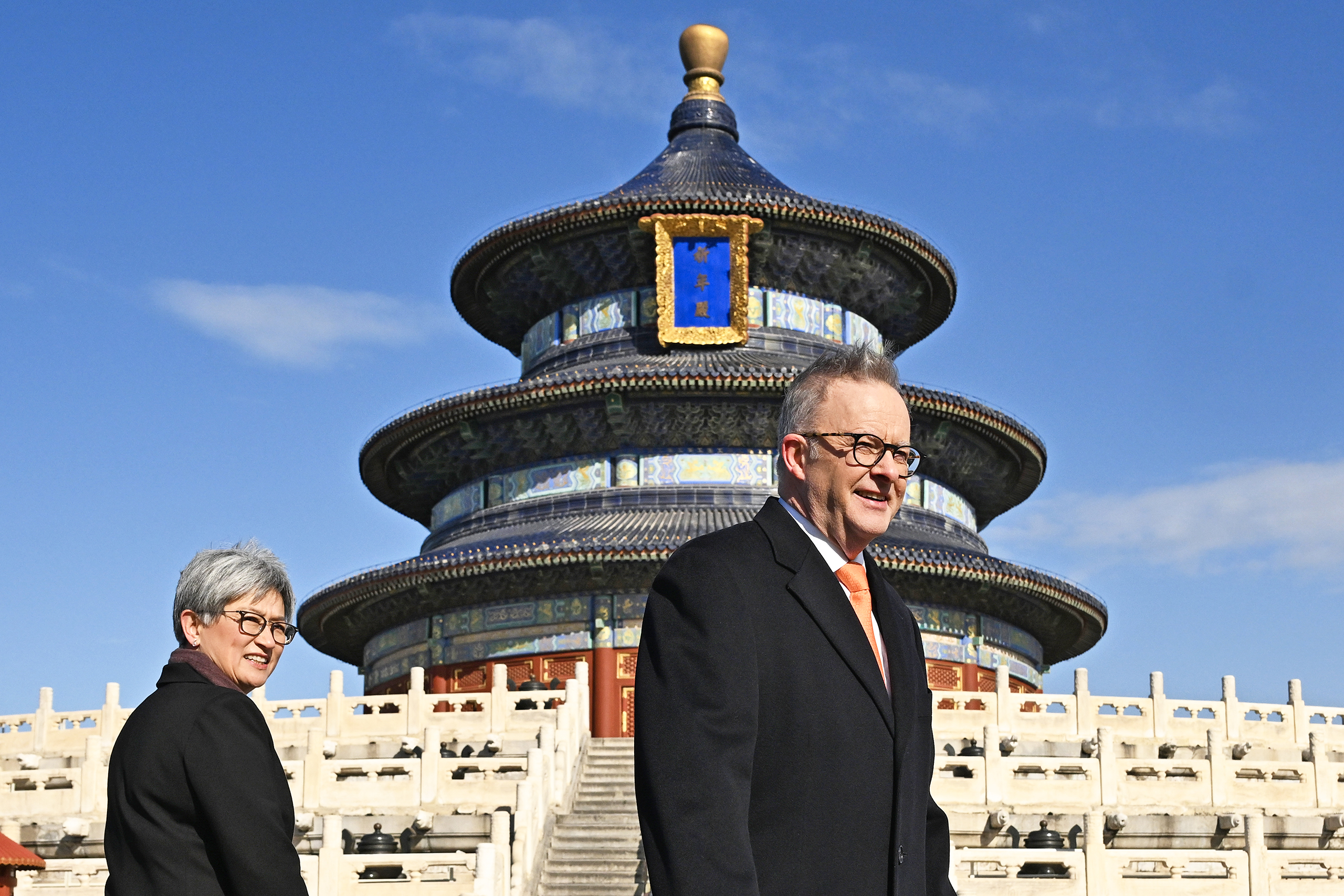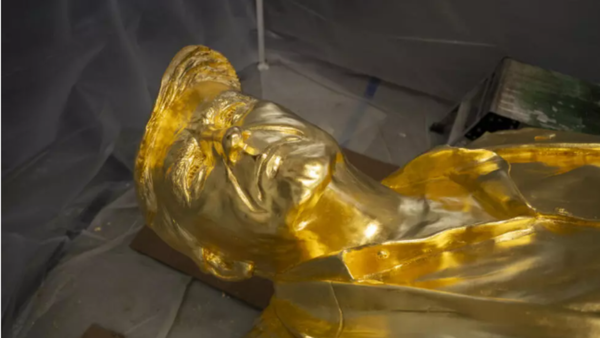
One Sunday morning nearly four years ago Kevin McCann was surprised to learn that an organisation he chaired was being hounded in the News Corp tabloids for being in “China’s grip” and “lobbying against Australia’s national interests.”
It was quite a shock for the former Macquarie Group chair, one-time partner in the big Sydney law firm Allens, member of numerous business and artistic boards and recipient of the Order of Australia. A surprise, too, for other members of the board, who included a host of eminent Australians drawn from diplomacy, intelligence, business, academia and politics — not to mention the organisation’s blue-chip corporate sponsors, including BHP Billiton, Rio Tinto and PwC.
The tabloid report, followed two days later by an attack in the conservative magazine Quadrant, was also the first indication for McCann’s Sydney-based organisation — the research institute China Matters — that its funding was being terminated by the federal government departments that had supported it financially since its founding five years earlier: Prime Minister and Cabinet, Foreign Affairs and Trade, Defence, Home Affairs, Industry, Innovation and Science, and Attorney-General’s. To further hobble its work, China Matters was to lose its tax-deductible status for private-sector donations.
“It was a victim of a new sort of policy of completely shutting down all conversation about Australia–China relations that didn’t accord with the then government’s position,” says Michael Wesley, deputy vice-chancellor of Melbourne University and China Matters board member. “It was a deliberate silencing of an organisation that was committed to facilitating a diversity of opinion and a genuine multisectoral discussion and debate about Australia’s relations with its major trading partner.”
It has taken a while, but Scott Morrison’s former government eventually achieved that objective. Last week, China Matters announced it is shutting down. Its executive director, internationally known China politics scholar Linda Jakobson, has returned to her native Finland after ten years in Australia.
The institute’s offence was to advocate a more nuanced response to China’s energetic program of spending and diasporic string-pulling, which aimed to build its influence abroad. Examples cited by the News Corp tabloids included China Matters’s alleged urging of Australia to join Xi Jinping’s $1.5 trillion Belt and Road Initiative (despite the organisation having declared it “does not have an institutional view” on the issue) and its “pushing back” against the foreign influence legislation introduced by Malcolm Turnbull in late 2017. The tabloids’ article included “demonstrable falsehoods and defamatory insinuations,” McCann wrote at the time, but his protestations fell on deaf ears in the government.
China hawks were ascendant in government and the media, unleashed by the outbreak of Covid-19 in Wuhan and Beijing’s clumsy handling of the epidemic. Scott Morrison was in weekly phone contact with Donald Trump’s secretary of state, Mike Pompeo, a fellow Pentecostalist. Foreign minister Marise Payne had cast doubt on whether China could be trusted to trace the virus’s origins, and Morrison said an international inquiry should have “weapons inspector powers,” by which he meant that Chinese sovereignty should be overridden.
When leading business figures, among others, pointed out that this kind of language was sure to draw retaliation, hawkish commentators turned on them. Peter Jennings, then heading the Australian Strategic Policy Institute, said they “have to understand the national interest is more important than a handful of wealthy businessmen continuing to make themselves rich dealing with an authoritarian China.”
The Sydney Morning Herald’s international and political editor, Peter Hartcher, described iron-ore tycoon Andrew Forrest as a “craven character” who had “chosen to campaign for a foreign authoritarian political movement” and “made the case for Australia to surrender.” Nine’s political editor at the time, Chris Uhlmann, said that “business captains and university chiefs have shown they can’t handle the truth. As long as the rivers of gold flowed, they were happy to urge silence…” But “silence means consent,” declared Uhlmann, including to the “imprisonment of a million Uighurs in Xinjiang.”
Events turned out as the government’s critics predicted. China cut back some $20 billion in non-strategic annual imports from Australia, including wine, beef, timber, barley and lobsters, with severe impacts in Australian regions. In response to an aggressive federal police raid on four official Chinese media correspondents, Beijing’s state security agency detained Chinese-Australian journalist Cheng Lei (who ended up being jailed for three years).
When I approached key figures in the Morrison government who are likely to know how the decision to punish China Matters was made, none was willing to comment (if they replied at all). The funding cut took away nearly half of the organisation’s funding.
Money has certainly been part of the reason for the closure, Jakobson told me from Helsinki. But by the time Labor came to power the institute had decided not to attempt to have the grant and tax break restored. The system of departmental grants had changed by then, and regaining tax deductibility would have been a “tedious, long and costly process,” she said.
Instead, the board decided to wind up and put remaining funds towards a fellowship program in the Australia–China Relations Institute at the University of Technology Sydney. The hope was that “there might be some really worthwhile, savvy, smart, dedicated Australians wanting to devote their careers to understanding what’s going on in the PRC.”
The China Matters story is likely to figure in the current review of federal government funding to national security–related research and education, commissioned by the prime minister’s department in early February. Heading the review is University of Queensland chancellor Peter Varghese, a former head of Foreign Affairs and one-time director-general of the Office of National Assessments.
“These programs deepen public discussion, strengthen partnerships, and inform policy debates on national security matters,” the announcement said. The review would look at whether they remain “appropriately aligned to Australia’s national interests and strategic circumstances,” examining the performance of funded institutes over the past five years, and making recommendations “to assist [government] agencies conducting relevant activities while achieving value-for-money, administrative efficiency, and appropriate levels of governance, accountability, probity and transparency.”
The announcement had scarcely any general media coverage but did cause a brief buzz in Canberra security circles. Some instant commentary saw it as a “Get ASPI” exercise — a reference to the hawkish Australian Strategic Policy Institute, led for many years by Jennings.
“The announcement of a review last week by Peter Varghese is widely anticipated as a move in preparation for defunding ASPI,” wrote Labor official turned consultant Cameron Milner in the Australian. “Such a decision should terrify all those worried that we’re not spending enough, not worrying enough and not preparing enough to defend our island continent.”
By defunding ASPI, Milner said, the government would be caving in to China’s so-called “fourteen demands,” as China hawks call the list of bilateral irritants handed to an Australian journalist in 2020 by a Chinese embassy diplomat — one of which was hostile scrutiny of contentious issues like the treatment of the Uyghur people — by a partially Australian government-funded institute, meaning ASPI.
ASPI’s prominence among Canberra voices raising alarm over China has certainly drawn criticism from quarters that would have appreciated China Matters’s approach. Concern was maintained when Jennings was replaced as ASPI’s head just before the 2022 election by another China hawk, Justin Bassi, who had been Marise Payne’s chief of staff when China Matters was defunded.
Two years into the Albanese government, ASPI no longer seems especially out of line with the stance of foreign minister Penny Wong and defence minister Richard Marles, who have been striving to balance diplomatic courtesy towards Beijing with support for closer alliance with the United States and large defence investments against a perceived Chinese threat. Nor can one imagine Varghese lending himself to any retribution, if that was the review’s aim.
Varghese has meanwhile been getting around the national-security think tanks and academic institutes. Although they number about fifty, he will probably concentrate on the top ten or so that get about 80 per cent of the government funding. They would include ASPI, the United States Studies Centre at Sydney University and two Australian National University outfits, the National Security College and the Strategic and Defence Studies Centre.
Those he’s spoken to think he will develop a set of principles to govern how the government funds strategic policy work rather than trying to prescribe what areas should get priority over others, which will change over time depending on trends and challenges.
As foreign affairs secretary, Varghese put funding into China Matters. Last year, introducing a China Matters oration by Kevin Rudd as University of Queensland chancellor, he made his feelings clear about the defunding decision. “China Matters knows that to understand China is not to endorse its policies,” he said. “By ceasing its funding the previous government apparently believed the opposite. This, despite the fact that China studies in Australia is going backwards.”
For her part, Jakobson hopes Varghese will recommend longer-term funding of key research institutes. “There has to be a willingness by the federal government to fund good strategic research which is not tied to three reports, two briefings and one conference a year, to give you an example of one of our contracts,” she says. “That’s not the way a genuine think tank can work. It can’t all be project-driven. It wears everyone out. There’s too many deliverables for the amount of money that’s being brought in.”
An endowment system would be better, she says, as was seen in the large sums the US Studies Centre received from the Howard government and Rupert Murdoch, and the Lowy Institute from property magnate Frank Lowy. “There has to be at least five-year if not a ten-year basic, foundational funding for a specialised institute like China Matters, which provides very specialised expertise on one country, a very important country.”
Jakobson sees a gap re-emerging in how Australia understands the People’s Republic of China. The Australia–China Relations Institute at UTS focuses on the bilateral relationship and the ANU’s Australian Centre on China in the World looks at a wide range of Chinese culture, she says. “But they don’t produce deep policy analysis of what’s going on in the PRC, which is what from the very beginning I saw Australia had a dire need for: to understand the drivers of what’s going on and why China’s making the decisions they are making.”
No doubt Peter Varghese is keenly aware of this gap. Meanwhile, the man whose government defunded China Matters, Scott Morrison, pursues his new post-parliamentary career as a defence industry consultant in partnership with Mike Pompeo. •
The post Think-tanked appeared first on Inside Story.







